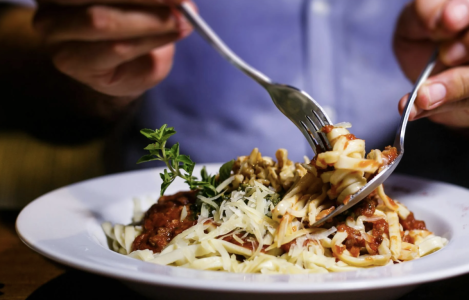Are you eating dinner at the wrong time? The best hour for better sleep (plus 2 snacks that help)
By
Veronica E.
- Replies 0
Disclaimer: The information provided in this article is for educational purposes only and is not intended as a substitute for professional medical advice, diagnosis, or treatment. Always consult your physician or other qualified healthcare providers with any questions you may have regarding a medical condition or before making any changes to your health regimen.
If you’ve ever found yourself wide awake at 2 a.m., staring at the ceiling and wishing for sleep, you’re not alone.
For many people, a full night of rest can feel frustratingly out of reach.
What you may not realize is that the timing of your dinner could play a big role in how well you sleep.
It’s not just about your pillow or bedtime routine—your plate and the clock matter, too.
Experts say adjusting when and what you eat, along with a few simple habits, can make all the difference for more restful nights.

The old advice to “avoid eating too late” isn’t just talk.
As bedtime approaches, the body gets worse at processing sugar.
A heavy meal too close to sleep can spike blood sugar, slow digestion, and leave you restless.
Experts recommend finishing dinner 2–3 hours before bed.
If you’re planning to turn in around 10 p.m., that means wrapping up dinner between 6 and 7 p.m.
Sometimes dinner doesn’t hold you until morning, and that’s okay.
The key is picking snacks that work with your body, not against it.
Have your snack about an hour before bedtime to give your body time to digest.
If you need something crunchy, swap chips for air-popped popcorn with light toppings like cinnamon or nutritional yeast.
And when it comes to processed foods, some are better than others—whole-grain breads, low-sugar yogurt, or nut spreads are much easier on your sleep than sweets or processed meats.
At the end of the day, small choices can have a big impact on how well you rest.
From timing dinner a little earlier to reaching for a handful of pistachios instead of a heavy snack, these adjustments can set the stage for deeper, more refreshing sleep.
Better nights mean brighter mornings—and who doesn’t want to wake up feeling ready to take on the day? Sweet dreams, GrayViners!
Read next: 6 foods dietitians say can boost your health after 60

What’s your go-to bedtime snack? Have you noticed a difference in how you sleep when you eat earlier? Share your tips and stories in the comments below—your advice could help another GrayVine reader get a better night’s rest!
If you’ve ever found yourself wide awake at 2 a.m., staring at the ceiling and wishing for sleep, you’re not alone.
For many people, a full night of rest can feel frustratingly out of reach.
What you may not realize is that the timing of your dinner could play a big role in how well you sleep.
It’s not just about your pillow or bedtime routine—your plate and the clock matter, too.
Experts say adjusting when and what you eat, along with a few simple habits, can make all the difference for more restful nights.

The right dinner timing can make all the difference for a restful night. Image Source: Pexels / Lucio Panerai.
Why timing your dinner matters
The old advice to “avoid eating too late” isn’t just talk.
As bedtime approaches, the body gets worse at processing sugar.
A heavy meal too close to sleep can spike blood sugar, slow digestion, and leave you restless.
Experts recommend finishing dinner 2–3 hours before bed.
If you’re planning to turn in around 10 p.m., that means wrapping up dinner between 6 and 7 p.m.
Also read: What if everything you know about sleep is wrong? How a scientist finally cured his insomnia
What to do if you’re hungry later
Sometimes dinner doesn’t hold you until morning, and that’s okay.
The key is picking snacks that work with your body, not against it.
- Pistachios: A natural source of melatonin, the hormone that regulates sleep.
- Cherries: Fresh or dried, they’re one of the few fruits that contain melatonin.
Have your snack about an hour before bedtime to give your body time to digest.
Also read: Are you sabotaging your sleep? What health experts say about eating these foods before bed to boost your metabolism
Smarter choices for evening cravings
If you need something crunchy, swap chips for air-popped popcorn with light toppings like cinnamon or nutritional yeast.
And when it comes to processed foods, some are better than others—whole-grain breads, low-sugar yogurt, or nut spreads are much easier on your sleep than sweets or processed meats.
Also read: Could this creamy fruit help you sleep better? Science says yes
Other habits that support better sleep
- Keep screens out of the bedroom: Phones and tablets keep your brain active when it should be winding down. Try reading or listening to calming music instead.
- Brush before breakfast: Dentists say brushing first thing helps clear overnight bacteria and protects enamel from your morning coffee or juice.
- Stay active: Even light movement once or twice a week—like a walk, some Wall Pilates, or playing with the grandkids—can improve sleep quality.
Also read: Eat smart: A nutritionist’s top 3 carbs for stress relief and healthy weight loss
The GrayVine’s sleep checklist
- Eat dinner 2–3 hours before bedtime
- Reach for pistachios or cherries if you need a snack
- Keep your bedroom a screen-free zone
- Wind down with reading or meditation
- Add a little weekly exercise
At the end of the day, small choices can have a big impact on how well you rest.
From timing dinner a little earlier to reaching for a handful of pistachios instead of a heavy snack, these adjustments can set the stage for deeper, more refreshing sleep.
Better nights mean brighter mornings—and who doesn’t want to wake up feeling ready to take on the day? Sweet dreams, GrayViners!
Read next: 6 foods dietitians say can boost your health after 60
Key Takeaways
- Experts recommend eating dinner at least 2–3 hours before going to bed to help digestion and maintain stable blood sugar for better sleep.
- If you get hungry after dinner, choose a light, plant-based snack like pistachios or cherries (which contain sleep-promoting melatonin), and have it about an hour before bedtime.
- Keeping your phone and other screens out of the bedroom can greatly improve sleep quality; instead, opt for relaxing activities like reading or meditating before bed.
- Regular exercise—whether formal workouts, Wall Pilates, or even active play with kids—can enhance sleep quality and general well-being, even if done just once or twice a week.
What’s your go-to bedtime snack? Have you noticed a difference in how you sleep when you eat earlier? Share your tips and stories in the comments below—your advice could help another GrayVine reader get a better night’s rest!






